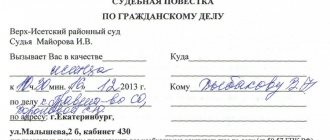In accordance with the Criminal Code of the Russian Federation, a threat to life and health is classified as a serious violation, for which the person who has become its victim has the right to demand not only that the guilty person be brought to criminal responsibility, but also that he be punished according to the severity of the consequences (neurosis, insomnia, mental disorder) compensation for moral damage.
In this article, we will tell you what can serve as a legal basis for filing a complaint with the police about a threat to life and health, how to draw it up correctly, what documents to attach to it, and what consequences to expect after filing it.
Multi-channel free hotline Legal advice on criminal law. Every day from 9.00 to 21.00
Moscow and region: +7 (495) 662-44-36
St. Petersburg: +7 (812) 449-43-40
The legislative framework
Legislative framework of the Russian Federation.
The procedure for bringing to criminal responsibility an offender who threatens to take the life or harm the health of another person is considered in Article 119 of the Criminal Code of the Russian Federation. If criminal intent is confirmed, the legal framework provides for the following sanctions for the guilty person:
- If there are no political, national or religious motives in the threats, the attacker will face 2 years in prison or restriction of freedom, or administrative arrest for up to 6 months.
- In the presence of aggravating circumstances excluded from the previous paragraph, the offender is punishable by imprisonment of 2 to 5 years. The court limits the list of positions held by the guilty person and the list of types of business activities available to the offender. The restrictions apply for 3 years.
Since the threat to human life and health causes concern, disrupts the usual way of life and negatively affects performance, the victim has the right to demand moral compensation from the offender. The monetary equivalent of the damage caused by the attacker is used to compensate for the damage.
To obtain a conviction in a procedural proceeding, the victim must submit a statement to the law enforcement agency, supported by irrefutable evidence. Each case is considered individually, including investigative measures to investigate the circumstances of the crime committed.
Evidence base
An insult can be inflicted in different situations: at the workplace, in the yard of a house, in a store. People can be rude and call you names over the phone, in a newspaper or magazine article, or on social networks.
Actions are regarded as an administrative violation if the following conditions are met:
- there is a conscious intention to offend a person;
- the offense was inflicted in an obscene form or expressed in obscene gestures.
A complaint against a citizen should be filed when there is evidence of illegal actions.
If the offense was caused in front of witnesses, then it is easier to obtain evidence: it is enough to ask those present to confirm in writing what was said or done and to obtain consent to participate in the trial.
In case of an incident in a public place, it is additionally recommended to look for eyewitnesses who recorded the scandal. Simple and undeniable confirmation of guilt is obtained when insulting people in the media - this is the article itself, a note, a video recording.
By phone
If there is a witness to an insult over the phone, then his testimony will be indisputable evidence of the conflict
If during a conversation the offended person finds himself alone, then the confirmation of the offense is the recording of one or, in the case of systematic incidents, several conversations. To do this, you can use a voice recorder or a smartphone application.
For a recording to become evidence, identification must be made:
- before starting the conversation, say the date, time, full name of the interlocutor;
- directly during communication, try to direct the conversation so that the offender identifies himself.
The fact of insult over the phone must be recorded.
Next, you need to make a verbal transcript of the recording for trial, and in the future it may be subject to examination.
No witnesses
The main thing in a situation where one-on-one personal insults begin is to remember to use a recording device.
If the victim did not have time to do this, then, quietly turning on the recorder, you should:
- repeat the offender’s negative words or name the indecent acts committed;
- demand an apology for any offense caused.
If the offender refuses to admit his guilt and continues his antisocial statements and actions, then this recording will become an evidence base.
You can call a person who will witness obscene language and start a conversation in front of him. Or join together with other citizens who have been victims of abuse and become witnesses for each other.
The same measures are also suitable for repeated negative attacks at the everyday level, for example, from neighbors. If you demonstratively turn on the recording device, it is possible to avoid a conflict.
Social media
Insults, indecent statements, swear words addressed to users of social networks also fall under Art. 5.61 Code of Administrative Offences.
The size of the fine depends on how the insult was inflicted: in personal correspondence or publicly.
To prove guilt, records should be used that refer to the person by name and identify the offender.
The text is recorded by:
- message screenshot;
- screenshot.
You also need to request log files from the social network administration to confirm the date and time of the conflict.
Electronic records provided to the court may be sent for examination.
Anonymous insults
It is almost impossible to punish an anonymous offender. Anonymous emails have been added to the traditional messages without a signature or return address, dropped into mailboxes or on office desks.
Using fake accounts, petty hooligans send offensive emails to anyone they want with impunity. Establishing the identity of the writer is a hopeless case.
Grounds for application
Filing a complaint to the police.
When protecting their life and health from the promised physical violence or death, the victim should immediately seek assistance from human rights authorities. The legislative framework recognizes the following factors as valid reasons for filing a threat report to the police:
- the criminal has a bladed weapon, firearm or other object with which he intends to cause bodily harm to the applicant;
- physical superiority of the attacker over the potential victim or manifestation of signs of mental abnormalities;
- attempts of violence against the victim, accompanying the voicing of threats by the offender.
If one or more signs from this list are present, the law enforcement agency is obliged to accept the application and assign an employee to investigate the crime. Separately, situations are considered when the offender, without hiding his intentions, threatens to kill or cause harm to health. In such cases, the basis for contacting the police is testimony confirming the criminal actions of the attacker.
Article of the Criminal Code of the Russian Federation
Danger to your life, and also a promise to deprive you of it, are covered under Article 119 of the Criminal Code . Accordingly, any threat against you is a crime for which criminal penalties are provided.
Threats can be part of other crimes, or isolated cases that stand apart. In any case, the article of the Criminal Code of the Russian Federation “Threat of murder or infliction of grievous bodily harm” comprehensively explains the position of the law regarding the occurrence of such situations.
Thus, threats to life are divided into:
- Driven by hatred of various types - from political to sexual;
- Having evidence or grounds to consider them potentially feasible to the victim.
In the first case, the law gives a very severe punishment that has no “ramifications” - 5 years of forced labor or imprisonment.
In the second, the person threatening you can receive:
- 2 years of restriction of freedom, forced labor or imprisonment;
- Six months of arrest;
- 480 hours of community service.
The indicated numbers are the upper “limit”. The terms and nature of the punishment themselves will depend on other factors such as the frequency, severity or thoroughness of the threats.
In either of the two cases, threats must be tested for:
- Their reality;
- Their feasibility;
- There are sufficiently compelling reasons to fear such actions.
If all these conditions (or one of them) are met, you can contact government authorities for the protection of citizens. Frivolous threats cannot be considered by these authorities as a potential criminal case.
Who accepts reports of threats to life and health?
Taking a statement to the police.
The Russian legal framework places responsibility for the safety of citizens on police officers. Therefore, you should apply for investigation of threats and insults to the territorial police department at the place of registration of the victim. The district police officer must accept the application and begin to carry out operational activities specified by legal standards.
In situations where the victim’s registration address does not coincide with his residence, it is permissible to file a complaint against an individual threatening to cause grievous bodily harm or premeditated murder at the police station closest to the residence. In such cases, the proceedings may be delayed. The employee who accepted the application is obliged to transfer the official document to the department at the place of registration of the victim.
If there are difficulties with a personal visit to the police or to save time, the victim can submit a complaint to law enforcement agencies through a proxy. To confirm the authority of the intermediary, you will need to issue a notarized power of attorney.
The regulatory framework does not prohibit the acceptance of applications submitted remotely. There is a special section for this on the Internet in the menu of the official State Services portal. By clicking on the “Appeal to the Ministry of Internal Affairs” tab, you can report a threat online.
In situations where police station employees do not find sufficient reasons for criminal prosecution and bringing the offender to justice, it is allowed to contact the prosecutor's service. A complaint to the prosecutor's office is filed in the same way as a statement to the police.
What article is provided for insulting honor and dignity?
Since 2012, in the Russian Federation, punishment for causing insults is regulated by a separate article of the Code of Administrative Violations - 5.61.
In accordance with it, for causing moral or physical harm, an administrative fine is imposed, the amount of which depends on who is to blame for the offense.
Penalties:
- From 1 to 3 thousand rubles. will pay an individual for indecent words or actions towards another person. If at the time of the insult the offender was performing official duties, then the fine increases to 30 thousand rubles. A legal entity will have to pay the offended person from 50 to 100 thousand rubles.
- If rude and offensive words are spoken in front of other people or in the media, the fine increases. It is imposed on individuals in the amount of up to 5 thousand rubles, on officials - up to 50 thousand rubles, on legal entities - up to 500 thousand rubles.
- In the absence of measures to prevent public insult of a person in the media, officials are punished with a fine of 10 to 30 thousand rubles, legal entities - from 30 to 50 thousand rubles.
Responsibility for insults is provided for in Article 5.61 of the Code of Administrative Offences.
How to write a police report correctly
Filing a police report about a threat to life.
When contacting human rights authorities, it is necessary to understand the difference between threats and attempted murder. In the first case, the matter is limited to verbal attacks, insults and scandals. The maximum that awaits the victim is a nervous breakdown caused by fears for health, and insomnia due to worries.
In the second situation, a person’s life is at risk. Only a happy coincidence can prevent a crime. The attacker can be stopped by law enforcement officers or bystanders.
If threats or plausible promises of beatings or murder are regularly voiced, the victim is advised to immediately contact the nearest police station to report the offense. In this case, it is permissible to file claims against the threatening person to the police department officer either orally or by writing a corresponding document according to the established template.
In the first case, the local or duty police officer himself records on paper or in electronic format the message of the citizen who has asked for help. Based on the information received in the form prescribed by regulatory standards, the police officer draws up a threat statement. The document is subject to official registration and transfer for preliminary investigation to an authorized officer.
Document structure and sample
Regardless of the type of media (A-4 paper or electronic sheet), the message about threatening statements is drawn up according to the established template. Its structure includes 5 basic blocks. These include:
- A cap. The introductory part contains the legal details of the authority where the application is being submitted. In the upper right corner of the page the number of the police station and the personal information of the head are indicated. Below you will find information about the victim, including full name, registration and residence addresses, and contacts.
- Name. Having skipped a line after the introduction, in the center of the sheet you need to write the name of the document with a capital letter.
- Description. The most voluminous part sets out the circumstances of the crime. When writing, it is recommended to adhere to a business information style, avoiding spatial reasoning, emotional statements or obscene language.
- Requirements. This paragraph of the statement contains a request from the victim to investigate the case and bring the attacker to justice in accordance with the rules prescribed in the Criminal Code of Russia.
- Applications. The final part lists documents confirming the fact of the commission of a crime, indicates personal data and contact information about witnesses who are ready to testify in court.
The application is completed with the date and signature of the victim. The signature is followed by a transcript containing the applicant’s surname and initials.
The police department has 10 days to verify the information received. The analysis includes a preliminary investigation, examination of provided documents, interviews with witnesses and other operational activities. If it is confirmed that there was criminal intent in the actions of the accused, the case is sent to court. Based on the results of the procedural proceedings, a decision is made on the penalties for the attacker.
How to register correctly
Despite the fact that the law does not establish a single application form, certain data must be included in it. If you submit an application without providing the required information, its consideration will be refused. The following instructions can be used as a kind of form on which to fill out the application. So, the document consists of the following components:
- At the top right in the so-called “header” you need to indicate the name of the department, full name. the boss to whom the document is addressed, as well as your personal data (full name, address, telephone).
- On the next line, the word “Statement” is written in the middle.
- Next, the red line sets out the essence of the act, which, in the applicant’s opinion, is unlawful in nature. In this case, the following words are used: “I ask that citizen such and such (or persons unknown to me) be held accountable under the law...”.
- After this, you need to indicate what harm was caused and the amount in monetary terms. It is good if there are documents confirming the damage. They should be attached to the application.
- If there are witnesses, they must be listed indicating their full name. and contact details.
- When deciding to contact law enforcement, you should be aware of the seriousness of this action. To confirm this, they write the phrase: “Warned of criminal liability for knowingly false denunciation (Article 306 of the Criminal Code of the Russian Federation).”
- At the end, indicate the date and put a signature.
If you contact the department in person, you must indicate your name, since an anonymous application will not be accepted. However, you can apply online this way. However, it must be understood that the anonymous nature in this case is only conditional, since it is not difficult to calculate the physical address from where the request was made using modern means of communication, available, for example, in such structures as the FSB. Therefore, a person submitting an application anonymously must understand that if he applies in connection with hooliganism or other similar motives, he will face serious consequences.
The following sample will help you better understand how to write an appeal to a district police officer.
To the head of the Department of Internal Affairs __ St. Petersburg
FULL NAME. and position
From Sergei Ivanovich Ivanov, residing at:
(specify)
Statement
I ask you to bring to justice Konstantin Fedorovich Andreev, who has a garden house next door to my garden house, located in the Salyut gardening partnership, located at the address: (specify). In view of the hostile relations that have developed between us for 3 years due to unresolved land relations, on October 16, 2016 Andreev K.F. threatened to kill me.
The threat was made under the following circumstances: (specify).
The form of the threat expressed is as follows: (repeat).
The following witnesses heard Andreev K.F. threatened to kill me, and they can confirm this fact: (list with full name and contact details).
I believe that my life and health, as well as my property, are at risk because there are the following reasons to fear this: (indicate the facts).
Based on the above, in order to protect the health and life of myself and my loved ones, as well as in order to prevent the commission of a crime, I ask that Andreev K.F. be punished.
Warned of criminal liability under Article 306 and Article 307 of the Criminal Code of the Russian Federation.
October 17, 2016 Ivanov S.I.
Where to contact
Cases when an application is refused.
In some cases, the police return a statement about a threat to the life and health of the victim and no investigation is carried out. Human rights officials argue that the refusal to open an investigation is based on insufficient grounds for criminal prosecution and a weak evidence base.
In some situations, law enforcement agencies perceive citizen complaints about plausible threats of grievous bodily harm or murder as false denunciations. Such statements are ignored by the police department.
If the police do not respond to the victim’s appeal and refuse to take protective measures, it is allowed to report criminal actions to the prosecutor’s service or the Ministry of Internal Affairs of the Russian Federation. A complaint to the prosecutor's office is processed according to an algorithm similar to a report of an offense to the police. The difference lies in the introductory part of the document, where instead of information about the territorial police station, data from another authority is indicated.
To receive and consider applications from Russian citizens to the Ministry of Internal Affairs, there is a corresponding tab on the official website of the State Service. Registration on the portal will be required. After this, you can contact the Ministry of Internal Affairs for assistance.
When reporting threats to law enforcement agencies, the victim must take into account the responsibility for unfounded accusations. If a false denunciation is written, it is punishable by a fine of 120 thousand rubles. or imprisonment in places of imprisonment for up to 2 years. Sanctions are prescribed in Art. 306 of the Criminal Code of the Russian Federation.
Procedure for reporting threats to life and insults
Responsibility for promises to deprive another person of life or cause him serious health consequences is provided for in Article 119 of the Criminal Code of the Russian Federation. Here, this crime is qualified as a separate act, but the threat of murder can also aggravate the offenses described in other articles of the Code. For example, it very often accompanies extortion.
When submitting an appeal, the citizen describes the situation in detail, and law enforcement officers conduct an investigation. Based on its results, a decision is made to initiate a criminal case or not.
The Supreme Court provided clarification, indicating that the condition for initiating a case is the ability of the author of the threats to cause the promised harm. The applicant must have real grounds for concern.
You are advised by the best qualified lawyers
Free: Our lawyers provide free initial consultation on any legal issues. 90% of cases are resolved with one free consultation.
24/7: real estate via online chat, or call the hotline 24 hours a day, 7 days a week
Note!
It is recommended to support the application with evidence, namely video, audio recordings of insults and threats, printouts of messages from the Internet and photographic materials. The testimony of witnesses also speaks in favor of the applicant.
The standard form for reporting threats to kill includes:
- A hat. The full name of the recipient of the application (head of the unit) and the applicant are indicated here. Addresses and contact information for communication are indicated.
- Content part. This describes the specific situation, namely the place, time and method of the threat, as well as information about the identity (if known) of the offender. This could be a phone call from a specific or unidentified number, a letter, a message on social networks, or personally spoken words. The following is the nature of the threat, namely a promise to take the life or cause harm to the health of the applicant or his relatives. At the end, the motives for the threats are indicated, most often it is personal hostility or financial debt. If the reason is racial or national hatred, the guilt of the author of the threats is aggravated.
- The final part. Here is a list of evidentiary materials and documents attached to the appeal.
- The date and signature are placed at the bottom.
The application is submitted not only during a personal visit to law enforcement agencies. It can be sent by registered mail or use the State Services portal. In order not to waste time, it is recommended to immediately transfer it to the territorial police department; as a result, the complaint will still be forwarded there.
Employees will conduct an investigation, and if the fact of threats is established, a criminal case will be opened against their author. The maximum term under this article will be 5 years in prison. It also provides for punishment in the form of correctional labor.
How to prove the validity of a claim
To punish the attacker, the statement must be supported by irrefutable evidence. According to Art. 119 of the Criminal Code of the Russian Federation, a crime consisting of a threat of harm to health or murder is classified as an offense of a private-public nature. Therefore, the victim’s appeal is a necessary condition for initiating a criminal case. In this case, the victim himself is obliged to formulate the evidence base.
The following evidence is accepted as evidence of a criminal's guilt in court:
- screenshots of computer correspondence containing fragments with a threatening orientation;
- telephone or voice recording audio recordings with plausible promises of causing grievous bodily harm, with the voice of the attacker clearly audible;
- attempted beatings or physical violence recorded on video;
- photographs of threats on walls, fences, posters and other media;
- testimony of persons familiar with the responsibility for false denunciation.
During the pre-trial investigation, all evidence is carefully checked. If necessary, an examination of the reliability of the information source is carried out. In procedural proceedings, only proven facts are taken into account. On their basis, a sentence is passed that corresponds to the severity of the crime committed.
How to prove the presence of a threat of murder or grievous bodily harm?
As stated in Art. 74 of the Criminal Procedure Code of the Russian Federation, evidence in a criminal case is any information on the basis of which the court, prosecutor, investigator, inquirer establishes the presence or absence of circumstances to be proven in criminal proceedings, as well as other circumstances relevant to the criminal case.
In other words, the victim has the right to submit to the court factual data on the basis of which the presence or absence of a crime, the motives for the crime, circumstances affecting the degree and nature of the responsibility of the accused, as well as other circumstances characterizing the personality of the accused, the nature and extent of the damage caused by the crime will be established. etc.
In 2022, the following will be accepted as evidence in a threat case:
- Expert opinions;
- Testimony of the victim;
- Testimony of witnesses (virtually any persons can become witnesses in a criminal case, with the exception of those listed in Part 2 of Article 56 of the Code of Criminal Procedure of the Russian Federation);
- Audio and video materials (for example, voice recordings or recordings from city surveillance cameras);
- Recordings of telephone conversations (you can record threats over the phone using free smartphone applications)
- SMS messages or emails (if threats come in the form of messages or comments, it is recommended to take screenshots and have them certified by a notary).
The role of the witness
Calling a witness to the police.
An eyewitness is a key figure in criminal proceedings in cases involving threats to life and health. The court's guilty or acquittal decisions are based on his testimony. The legislative framework of the Russian Federation places responsibility for searching and attracting witnesses on the injured party.
Timely appeals to law enforcement agencies by eyewitnesses of the impending crime saved many lives. The civic duty of every Russian is to immediately report to the appropriate authorities about probable offenses that he is ready to witness. Legal norms provide for the possibility of anonymously filing a statement about planned criminal actions.
What could be evidence of a threat?
Article 119 of the Criminal Code of the Russian Federation states that the case is initiated upon the application of the injured person. To attract a criminal, it is necessary to prepare evidence and make a statement. Since the injured person seeks help, it is he who searches for evidence. There should be enough supporting factors for the investigator to open a case. These may include:
- printouts of messages, SMS, correspondence on social networks containing threats and insults;
- audio recordings where a specific person is heard threatening or insulting the victim;
- video recordings where the fact of threats is recorded;
- photos of threats or reprisals;
- testimony of witnesses and eyewitnesses.
It is best to start looking for evidence in advance, even before an official application is drawn up and submitted. If a person receives threats and insults regularly, then you should contact the police immediately.







